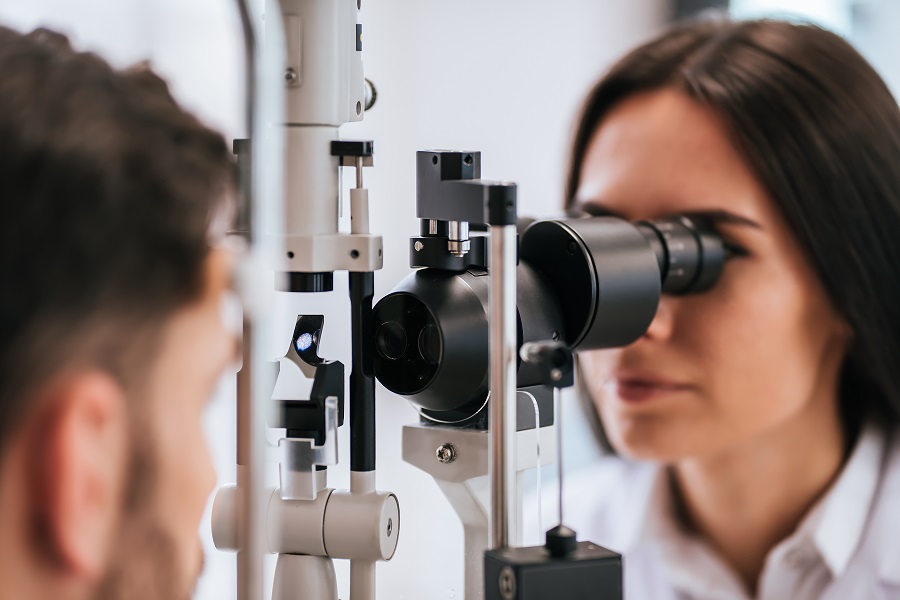7 Health Conditions Your Eyes Can Reveal

Some say your eyes are the window to your soul. But eyes can show you issues with your overall health. An eye doctor can detect a host of health conditions during an exam just by noting changes in tissues, nerves and blood vessels. As a result, the importance of annual vision exams can’t be emphasized enough.
What Can Your Eyes Tell You About These Health Conditions?
You may be surprised to know that your eyes have the chance to reveal these health conditions:
- High blood pressure High blood pressure or hypertension often goes undetected until you have a health incident or visit your primary care (PCP) doctor. However, when your eye doctor shines that light in your eyes, it may reveal clues that could help prevent a life-threatening heart attack or stroke. If blood vessels are twisted, kinked, or leaking, or if your optic nerves are swollen, it can be a sign of high blood pressure. Your eye doctor will recommend you talk to your PCP about managing your blood pressure.
- High cholesterol One sign of high levels of cholesterol or lipids is yellow, fatty deposits around your eyelid that an ophthalmologist can see. Another is something called arcus senilis. These are gray or white arcs visible above and below the outer part of the cornea (which covers the front of your eye). In younger adults, these arcs may be a sign that you may require cholesterol management. In older adults, the arcs aren't related to high cholesterol and are of lesser concern. Occasionally, plaque can be detected in the retinal blood vessel. This should trigger an urgent visit to your PCP or cardiologist for management of the underlying high cholesterol.
- Diabetes For some people, it’s their eye doctor that may diagnose their diabetes. When blood sugar levels go up very high, vision may be blurry, leading to suspicious changes in glasses or contact lens prescriptions. And, when blood sugar is not controlled well for a while, blood vessels in the retina become fragile, causing bleeding. While this bleeding may not be affecting your vision, it’s possible an eye exam reveals diabetes before a blood sugar test. When diabetes is left untreated, it can lead to diabetic retinopathy, resulting in impaired vision or even loss of sight. Diabetic retinopathy is the No. 1 cause of vision loss in working-age adults in the U.S.
- Autoimmune diseases Droopy eyelids or inflammation of the eye or optic nerve (connects to your brain) could be a sign of multiple sclerosis, myasthenia gravis, Crohn’s disease, sarcoidosis or Behcet’s disease.
- Thyroid disease Enlarged, bulging eyes might be a sign of a condition called Grave’s disease, an autoimmune condition. The disease affects the thyroid gland, the eyeball and the eye socket. Patients may develop eye pain, double vision or even vision loss in advanced disease. Other symptoms are weight loss, anxiety and a rapid pulse.
- Rheumatoid arthritis While rheumatoid arthritis typically affects the joints, some individuals might experience inflammation of the iris (colored part of the eye), uvea (middle layer of the eye) or sclera (white outer layer of the eye). Ophthalmologists can detect inflammation during an eye exam.
- Cancer of the eye A pearly bump or red sore on the eyelid or loss of lashes might be a type of skin cancer known as basal cell carcinoma. Spots in the back of the eye or a change in the color of your eye can sometimes indicate a cancer known as ocular melanoma.
The moral of the story is that your eyes really do tell a story. It’s important to schedule your annual eye exam as it can often catch things before they get serious. And don’t let symptoms linger if something is bothering you. To schedule an eye appointment, call 855-UMASS-MD (855-862-7763).
Note: The content of this blog is for informational purposes only. It is not intended for use as diagnosis or treatment of a health problem or as a substitute for the professional consultation of a physician or qualified health care provider. If you have specific questions or concerns regarding a health or medical condition, contact your physician or a licensed health care professional.

